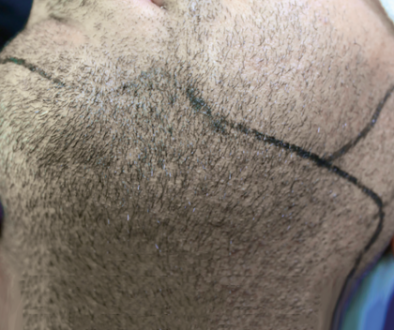Is it Safe to Use Propecia (Finasteride) for Hair Loss Around a Pregnant Woman?
This question comes from a member of our hair loss social community and discussion forums:
My wife and I are trying to become pregnant, and I’m wondering if it is safe to use Propecia (finasteride) while we’re trying to conceive and after she becomes pregnant?
 Finasteride, the active ingredient in Propecia, is an inhibitor of the type II 5-alpha-reductase enzyme. This enzyme is responsible for converting testosterone into the hair loss-causing dihydrotestosterone (DHT) hormone. Because it blocks the creation of DHT, finasteride effectively halts and reverses progressive alopecia (hair loss). However, the same DHT hormone that causes hair loss in adults also plays a significant role in the development of a fetus in pregnant women. The hormone is needed for proper formation of the male sexual organs, and a deficiency of DHT or the 5-alpha-reductase enzyme can result in a variety of birth defects – including a lack or deformation of secondary sexual characteristics (i.e. the male genitalia). This is why physicians really recommend that the drug be avoided by any woman of child-bearing age.
Finasteride, the active ingredient in Propecia, is an inhibitor of the type II 5-alpha-reductase enzyme. This enzyme is responsible for converting testosterone into the hair loss-causing dihydrotestosterone (DHT) hormone. Because it blocks the creation of DHT, finasteride effectively halts and reverses progressive alopecia (hair loss). However, the same DHT hormone that causes hair loss in adults also plays a significant role in the development of a fetus in pregnant women. The hormone is needed for proper formation of the male sexual organs, and a deficiency of DHT or the 5-alpha-reductase enzyme can result in a variety of birth defects – including a lack or deformation of secondary sexual characteristics (i.e. the male genitalia). This is why physicians really recommend that the drug be avoided by any woman of child-bearing age.
Clearly, this helps demonstrate the risks of exposing a pregnant or potentially pregnant female to finasteride, but it still does not explain whether or not it is safe to use finasteride around a pregnant partner. While the research specifically discussing this issue is lacking, a review of several peer-reviewed data bases explains the following:
First, finasteride is classified as a category X drug; this means that its use in pregnancy is completely contraindicated (i.e. you cannot use it at all while pregnant). Frankly, this is no surprise and really doesn’t provide any additional information as to whether or not it can be used around a pregnant partner.
Second, another review of finasteride claims the active ingredient of crushed or broken tablets can be absorbed through the skin. Unbroken tablets are coated, which prevents contact with the active ingredient during normal handling, but women should avoid contact with crushed or broken tablets. The same article claims pregnant women should avoid semen from a male partner exposed to finasteride.
There are three important things to “take home” from this information: 1. Crushed tablets (which is important for hair loss sufferers who buy 5mg Proscar tablets and cut them into quarters) can be absorbed through the skin and may cause risk if used around a pregnant partner; 2. The research claims the semen of a finasteride user is potentially harmful to a female who is pregnant or planning on becoming pregnant; 3. Unbroken/non-crushed tablets are coated, and this allegedly prevents any sort of unwarranted contact with the finasteride.
In my mind, the second point is something that warrants further discussion/expert input. Frankly, I’ve heard differing opinions regarding the level of finasteride in semen and whether or not it can actually cause issues in pregnant females. This is why I think it’s something that needs to be discussed thoroughly with the physician prescribing the medication/the pregnant partner’s OB/GYN.
Altogether, it seems like the evidence surrounding potential finasteride exposure in the pregnant female is pretty scarce. While I’m kind of surprised by this, I think there are a few important points to remember: 1. DHT and functional 5-alpha-reductase enzymes are crucial for development of the male fetus; inhibition or deficiency of either of these elements can have serious consequences. 2. Exposure to broken/crushed tablets is cited as a risk for pregnant females. Evidence shows the crushed powder can be absorbed through the skin; this is important for members who purchase 5mg Proscar and cut it into four 1.25 mg pieces. 3. The level of finasteride in semen and the effect this may have on the pregnant female is, from what I’ve seen, debatable and likely requires further research. Some say it’s high enough to cause issue, others don’t seem to think it is significant.
Knowing this, I think it is important for all patients using finasteride around a pregnant female to thoroughly discuss continued finasteride use and pregnancy with both the physician who prescribed the medication and the female partner’s OB/GYN. This will help ensure all parties are informed and safe.
_________
Blake Bloxham – formerly “Future_HT_Doc”
Editorial Assistant and Forum Co-Moderator for the Hair Transplant Network, the Hair Loss Learning
Center, the Hair Loss Q&A Blog, and the Hair Restoration Forum
Follow our community on Twitter
Watch hair transplant videos on YouTube
Technorati Tags: hair loss, Propecia, finasteride, dihydrotestosterone, DHT, hair loss sufferers



